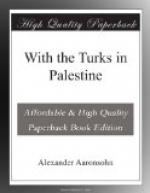The days and weeks following were busy ones. From morning till night, it was drill, drill, and again drill. We were divided into groups of fifty, each of which was put in charge of a young non-commissioned officer from the Military School of Constantinople or Damascus, or of some Arab who had seen several years’ service. These instructors had a hard time of it; the German military system, which had only recently been introduced, was too much for them. They kept mixing up the old and the new methods of training, with the result that it was often hopeless to try and make out their orders. Whole weeks were spent in grinding into the Arabs the names of the different parts of the rifle; weeks more went to teaching them to clean it—although it must be said that, once they had mastered these technicalities, they were excellent shots. Their efficiency would have been considerably greater if there had been more target-shooting. From the very first, however, we felt that there was a scarcity of ammunition. This shortage the drill-masters, in a spirit of compensation, attempted to make up by abundant severity. The whip of soft, flexible, stinging leather, which seldom leaves the Turkish officer’s hand, was never idle. This was not surprising, for the Arab is a cunning fellow, whose only respect is for brute force. He exercises it himself on every possible victim, and expects the same treatment from his superiors.
So far as my comrades and I were concerned, I must admit that we were generally treated kindly. We knew most of the drill-exercises from the gymnastic training we had practiced since childhood, and the officers realized that we were educated and came from respectable families. The same was also true with regard to the native Christians, most of whom can read and write and are of a better class than the Mohammedans of the country. When Turkey threw in her lot with the Germanic powers, the attitude toward the Jews and Christians changed radically; but of this I shall speak later.
It was a hard life we led while in training at Saffed; evening would find us dead tired, and little disposed for anything but rest. As the tremendous light-play of the Eastern sunsets faded away, we would gather in little groups in the courtyard of our mosque—its minaret towering black against a turquoise sky—and talk fitfully of the little happenings of the day, while the Arabs murmured gutturally around us. Occasionally, one of them would burst into a quavering, hot-blooded tribal love-song. It happened that I was fairly well known among these natives through my horse Kochba—of pure Maneghi-Sbeli blood—which I had purchased from some Anazzi Bedouins who were encamped not far from Aleppo: a swift and intelligent animal he was, winner of many races, and in a land where a horse is considerably more valuable than a wife, his ownership cast quite a glamour over me.
[ILLUSTRATION: THE AUTHOR ON HIS HORSE KOCHBA]




